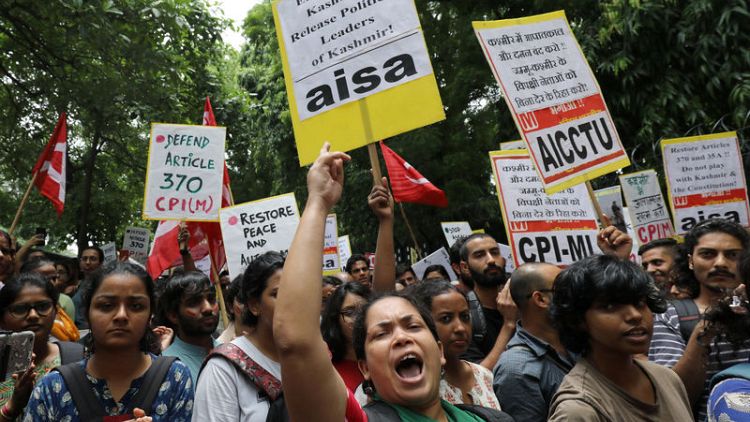By Devjyot Ghoshal and Fayaz Bukhari
SRINAGAR, India (Reuters) - Thousands of Indian security forces kept a lid on protests in disputed Kashmir on Wednesday, helped by the continued suspension of telephone and internet services after the Himalayan region's special status was scrapped this week.
Neighbours China and Pakistan, which both claim parts of the region, have voiced fierce opposition to India's move dropping a constitutional provision that had allowed the country's only Muslim-majority state to make its own laws.
Streets in the region's main city of Srinagar were deserted for a third day, with almost all shops shut, barring some chemists. Armed federal police manned mobile checkpoints across the city, limiting people's movement.
Knots of young protesters threw stones at soldiers, police and a witness said, amid anger over the telecoms clampdown that began on Sunday.
"These (protests) are mostly localised because of the heavy troop deployment," said a police officer who sought anonymity because he was not authorised to speak to media, adding that police used tear gas and pepper spray to scatter the protesters.
A witness described an episode of hours of stone-throwing on Tuesday in the Old Barzullah area near the city centre, saying, "I saw around 100 boys, in small groups, pelting stones."
He added, "The police fired tear gas to beat them back."
Prime Minister Narendra Modi's government detained regional leaders and heads of separatist groups before Monday's announcement, which also split the state into two federal territories to ensure greater control.
India has been fighting an armed revolt in Kashmir since 1989, which it blames Pakistan for stoking. In reply, Islamabad says it only gives moral and diplomatic support to the Kashmiri people in their struggle for self-determination.
MEDICAL SERVICES
All telephone, television, and internet connections stayed severed. By night, police vans had patrolled the streets, with loudspeakers warning residents to stay indoors.
Jammu and Kashmir Governor Satya Pal had asked officials to ensure people had enough supplies and assured them of their security, Reuters partner ANI said in a report.
Local authorities have not declared a curfew, but instead clamped down on non-essential travel and gatherings of four or more, effectively keeping restive people in their homes.
South Kashmir, the epicentre of the insurgency in recent years, was completely locked down, said a state government official who visited the area.
"The highway was deserted, except for some trucks and buses carrying labourers out of the valley," added the official, who asked not to be named.
Officials of emergency services, such as hospitals and the fire department, said their staff were also frequently stopped at checkpoints, with access sometimes blocked.
The principal of Srinagar's Government Medical College, which runs the state’s largest hospital network, comprising about 3,500 beds, has to personally visit district officials to coordinate services or seek approvals, a hospital official said.
"The principal doesn’t have any means of communication," added the official, who asked not to be identified. "Police stations have been given satellite phones but not him. That shows their (government’s) priority."
About 200 police and local administration officials have received satellite phones, with several hundred more using a restricted military network, a police official said.
One hospital that is part of the medical college asked patients to leave as doctors and staff numbers dwindle.
"If we go, we don’t know whether we’ll be able to come back in case there’s any complication," said Syed Tabasum, a cancer surgery patient worried at having to leave before her discharge set for Friday.
Srinagar’s fire officials also fear people might not be able to reach them in emergencies.
"Communication is a lifeline," said one fire official, who requested anonymity. "Only if someone contacts us can we do something."
A radio communications network links the city's 21 fire stations, but with telephone lines down and no satellite phones, firemen can only be alerted by a call from police or an individual who visits a fire-station.
One such individual told authorities of a three-storey blaze late on Monday, but by the time fire trucks got to the site, the fire had destroyed the first floor, another fire official said.
(Editing by Sanjeev Miglani and Clarence Fernandez)
